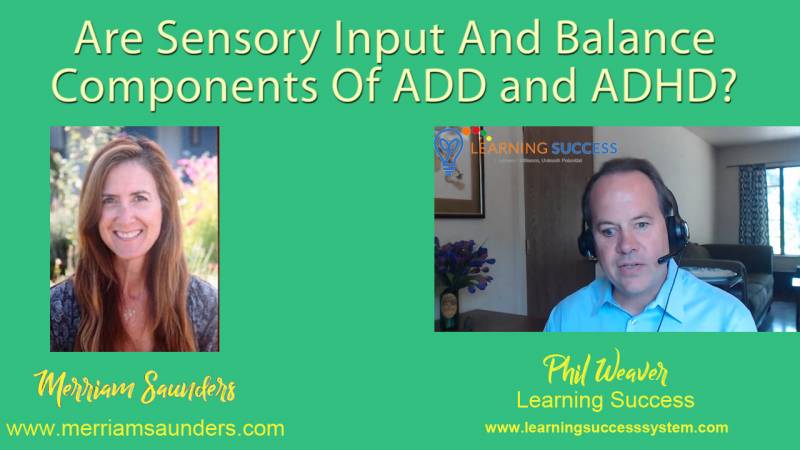
Phil: Let's jump to, you touched before on sensory input and again, can you mention what role do you think sensory input plays in Adhd or just the ability to focus?
Merriam: So sensory input is going to be one of those things that some children with Adhd have and others might not. and so, you know, if you have a child who absolutely hates certain noises or, sights, or textures, the feel of some types of food in their mouth, then, you know, those aren't children that are just being difficult. Those are children that have sensory issues and they're very, very real to those children. Those sensory issues can make you feel like you want to crawl out of your own skin and you can't get away. So they're not going to impact every child, but some, some children will have them and it's, you know, it absolutely can be something else that just gets in the way of learning. If you're bothered by your underwear tag, how are you supposed to pay attention in school all day? And this is something that's just making, you know, want to get out of your body.
Phil: Right, right. How about balance as a sensory input?
Merriam: Again, I do know that there are some children that have balance issues, are have fine motor problems or gross motor problems. You know, it's not, it's definitely not across the board. There have been some, you're probably familiar with, some treatment facilities that open up that work on those kinds of balancing issues. Yeah. I'm not aware of any particular studies that show that, that, that will be any kind of a cure all, but there are a lot of parents that feel for their children with balance issues that it's very helpful.
Phil: Right. I know as a, as a martial artist, one of the tricks that we do, as a fighting trick is that we learned to absolutely control another person's balance and it actually shuts off their brain. They can't do anything because you've gone into a system one brain function, you know, and there's, there's so much cognitive processing needed to maintain balance. And so on the other side of that. We develop our own balance and I've seen a lot of kids with different learning disabilities just by developing balance and learning proprioception seems to have a pretty big effect. I know that there's one researcher who talks about vestibular input as a cause for like dyslexia and things. I, I don't know that that's 100% true, but I think that there's some, some lines of thought there.
Merriam: Yeah. And, in addition to martial arts, I personally, my daughter was a horseback rider, my daughter with Adhd and you know, similar, it's a similar type of balancing side to side, on the body, you know, so there are a lot of people that also believe that something like that can be super helpful. So again, yeah, if that's something that is challenging for your child, we, we haven't even begun to scratch the surface of our understanding between, you know, what we do with our bodies and how that impacts are the areas of our brain.
Phil: That was actually somewhere I was going to go with that with her. Because I noticed you have a horse on your website.
Merriam: Oh yeah, yes. Yeah.
Phil: Okay. So, so in, in martial arts of the, our primary stance is called the horse stance or horse riding stance. And it feels exactly like riding a horse. I grew up riding horses, western style. Okay. No clue if it's when it comes to English. But I did ride western style every day, of my life from age like seven on. So, the feeling of the stance in martial arts is exactly the same in our martial art. We're pushing the heels out or pushing the heels down. and of course you're posting, you know, there's a huge crossover. So on your website you did mention different types of mind body exercises and I was going to mention that I would actually consider horseback riding one of those.
Merriam: Yeah!
Phil: So going back to balance, most people consider, you know, the vestibular input as as your primary source of balance and maybe a secondary, the secondary source as your vision, your sense of the horizon. And I would argue that the fear feeling in your feet, actually should be your primary source of balance. And, of course that's what horseback is going to train. Horseback riding is going to train that and, and really develop that. And since I, you know, I think that that if there is a little bit of balance off that it can so quickly override the brain and lose attention that maybe there's something to look at there. Maybe you were inadvertently helping your daughter out by the horseback riding.
Merriam: Right, right. I know it was, we lucked out with that one.
Get the full interview here
Do You Need help with a Learning Difficulty?
Our simple online analysis will help you get to the core of the problem and find the right solution for you.
Understanding how to help someone with a learning difficulty starts with understanding which micro-skills are affected. When you learn which of the micro-skills is the problem, you will then be on your way to solving it.
You'll also learn how to:
- Build confidence
- Enhance Learning ability
- Eliminate avoidance
- Build grit
You can get this analysis for free by filling out this simple form. This will help you get to the bottom of a learning difficulty and provide you with a solution. If you are ready to put this problem behind you click the button below and fill out the form.










